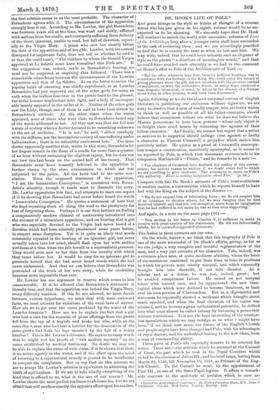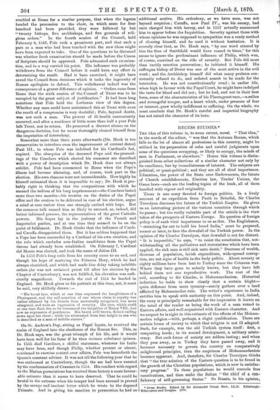ANY great change in the style or habits of thought
of a veteran
writer who has just given us his eighth volume would be so un- expected as to be alarming. We sincerely hope that Dr. Hook
will continue to enrich the world with successive volumes of Lives of the Archbishops long after a younger critic shall have succeeded
to the task of reviewing them ; and we are accordingly gratified to find that he is exactly the same as when we last met him. We may wish, indeed, that he could have unlearnt such an elegance of style as the phrase "a diarrhcea of meaningless words," and that he could have avoided such obscurity as we find in this comment on Ilenry's offer to Pole of the Archbishopric of York :—
remarkable coincidence between the circumstances of the Lourdes "But the offer, whatever may have been its political bearings, was in accordance with the feelings of the King, who could enjoy the luxury of apparition and that of La Salette. As on the latter occasion the giving pleasure when the gift did not interfere with his passions sensual popular habit of swearing was chiefly reprobated, BO at Lourdes or malignant, or with the selfishness which, in many ways, rendered a Bernadette had just reproved one of the other girls for using an man despotic, tyrannical, or cruel, by whom in the absence of a Nathan oath when the leafless rose-tree in the grotto bent to the ground, those vices, in other persons, would have been denounced."
the niche became resplendent with light, and a lady of incompar- Again, following as we do the almost universal custom of English able beauty appeared in the midst of it. Neither of the other girls literature in publishing our criticisms without signature, we are saw the Lady, though one of them is said to have been struck by sorry to observe that a man of kindly temper, who evidently wishes Bernadette's attitude. At the other times when the vision to think as well as possible of all his fellow-creatures, should appeared, none of those who were close to Bernadette heard any believe that anonymous writers are what he does not believe the of the words addressed to her. All they saw was that she fell into Marian persecutors to have been, persons "whose only object is a state of ecstasy which a doctor declared to be something unknown to delight their cruel hearts by witnessing the agonies of their to the art of medicine. "it is not," he said, "either catalepsy fellow-creatures." And finally, we cannot but regret that a writer with its stiffness, nor the unconscious ecstacy of one suffering under so anxious to be impartial should indulge even against so faulty hallucination ; there is no unhealthy excitement here." The same a character as Thomas Cromwell a prejudice which makes him doctor apparently certifies that, whilst in this state, Bernadette let positively unfair. He quotes as a proof of Cromwell's unscrupu- her fingers remain in the flame of a candle for more than a quarter bus temper a conversation, manifestly apocryphal, as it seems to of an hour without sustaining the slightest injury, but he does not us, reported by Pole, in which that statesman recommends to his say how this fact bears on the second half of his theory. That companion Machiavelli's "Prince," and he remarks in a note :—
of it by showing that Bernadette had never before heard the words "We do not suspect him of fabricating facts ; we do not suspect him "Immaculate Conception." He quotes a statement of hers that of an intention to deceive others, for we may imagine that he first she kept repeating them all along the road to the presbytery for deceived himself, and that his self-deception arose from an imagination
that he had suffered in the cause he was at that timo supporting."
the account of a miraculous apparition, and on hearing that a girl " This section in his letter to Charles V. is sufficient to make us who was especially devoted to the Virgin had never heard of a receive with great caution all his statements. He did not intentionally doctrine which had been solemnly proclaimed some years before, falsify, but he coloured exaggerated statements." to suspect some deception. Yet it is quite as likely that words The italics in these extracts are our own.
And again, in a note on the same page (66) :— sembled at Rome for a similar purpose, that when the legates headed the procession to the choir, in which seats for four hundred had been provided, they were followed by but "twenty bishops, five archbishops, and five generals of reli-
gious orders." In the fourth session of the Council, held February 8, 1546, Pole took a prominent part, and that such a part as a man who had been touched with the new ideas might have been expected to take. One of the questions to be discussed was whether fresh examination should be made before the Canon of Scripture should be approved. Pole advocated such examina- tion, and in a way carried his point. His influence was probably withdrawn from the Council before it could have any effect in determining the result. Had it been exercised, it might have saved the Council from decisions which it tasks the ingenuity of Roman apologists to defend. This withdrawal indeed was the consequence of a graver difference of opinion. "Orders came from Rome that the sixth session of the Council of Trent was to be occupied by the great subject of justification." It had been long notorious that Pole held the Lutheran view of this dogma.
Whether any man could have maintained this at Trent with even the result of a compromise is very doubtful ; Pole, beyond doubt, was not such a man. The pretext of ill-health conveniently occurred, and after a residence of little more than half a year Pole left Trent, not to return. He preserved a discreet silence on the dangerous doctrine, but he never thoroughly cleared himself from the imputation of heterodoxy.
Somewhat more than three years afterwards (Dr. Hook is too conservative to introduce even the improvement of current dates) Paul III., to whom Pole was indebted for his Cardinal's hat, expired. The obsequies of the deceased Pope and the proceed- ings of the Conclave which elected his successor are described with a power of description which Dr. Hook does not always exhibit. Pole had been summoned to Rome when the Pope's illness had become alarming, and, of course, took part in the election. His own chances were not inconsiderable. How highly he himself estimated them it is impossible to say ; Dr. Hook is pro- bably right in thinking that the compositions with which he amused the tedium of his long imprisonment—the Conclave lasted more than two months—his treatise on the duties of the Papal office and the oration to be delivered in case of his election, argue a mind at ease rather than one strongly excited with hope. But the common talk named him as likely to succeed, as, indeed, did better informed persons, the representatives of the great Catholic powers. His hopes lay in the jealousy of the French and Imperialist parties, and at one time they seemed to be on the point of fulfilment. Dr. Hook thinks that the influence of Cardi- nal Caraffa disappointed them. But it has seldom happened that a Pope has been succeeded by a Cardinal of his own creation, and the rule which excludes non-Italian candidates from the Papal throne had already been established. On February 7, Cardinal del Monte was elected, and took the name of Julius III.
In 1553 Pole's long exile from his country came to an end, and though his hope of marrying the Princess Mary, which he had always cherished, and which had made him delay taking indelible orders (he was not ordained priest till after his election by the Chapter of Canterbury), was not fulfilled, his elevation was suffi- ciently magnificent. Towards the end of 1554 he landed in England. Dr. Hook gives us his portrait at this time, not, it must be said, very skilfully drawn :—
" His broad face, which at one timo expressed the haughtiness of a Plantagenet, and the self-assertion of one whose claim to royalty was rather affirmed by his friends than universally recognized, was more elongated, and wore an expression of severity. His eyes, which could at one time flash fire as he denounced the iniquities of Henry VIII., had now an expression of gentleness. His beard, still brown, flowed curling down upon his chest while his attenuated form lent height to one who is described as a man of middle stature."
On St. Andrew's Day, sitting as Papal legate, he received the realm of England into the obedience of the Roman See. This, as Dr. Hook says, was the great triumph of his life, and it would have been well for his fame if he then animam exhalasset opimam. In 1555 died Gardiner, a skilful statesman, whatever his faults may have been, and though Philip, whether present or absent, continued to exercise control over affairs, Pole was henceforth the Queen's constant adviser. It was not till the following year that he was enthroned at Canterbury, though the see had been vacated by the condemnation of Cranmer in 1554. His conduct with regard to the Marian persecutions has received from history a more favour- able estimate than it seems to have deserved. That he could be brutal in the extreme when his temper had been aroused is proved by the savage and insolent letter which he wrote to the deposed Primate. And in giving his sanction to persecution he had an additional motive. His orthodoxy, as we have seen, was not beyond suspicion ; Caraffa, now Paul IV., was his enemy, had once charged him with heresy, and in 1557 actually summoned him to appear before the Inquisition. Severity against those with whose opinions he was supposed to sympathize was a ready method of clearing himself, and he used it without hesitation. It is scarcely clear that, as Dr. Hook says, "by one word uttered by him the fires of Smithfield would have ceased to blaze," for this seems to ignore the predominant influence of Philip, which was, of course, exercised on the side of severity. But Pole did more than tacitly sanction persecution ; be initiated it himself. His suffragan bishop of Dover was one of the most active in the evil work ; and the Archbishop himself did what many prelates con- sistently refused to do, and ordered search to be made for the heterodox. He was not constitutionally cruel ; in earlier life, when high in favour with the Papal Court, he might have indulged the taste for blood and did not ; but he had, and not in their best form, some of the characteristics of his Plantagenet race,—a sullen and revengeful temper, and a heart which, under pressure of fear or interest, grew wholly indifferent to suffering. On the whole, we must conclude that Dr. Hook's careful and impartial biography has not raised the character of its hero.



































 Previous page
Previous page